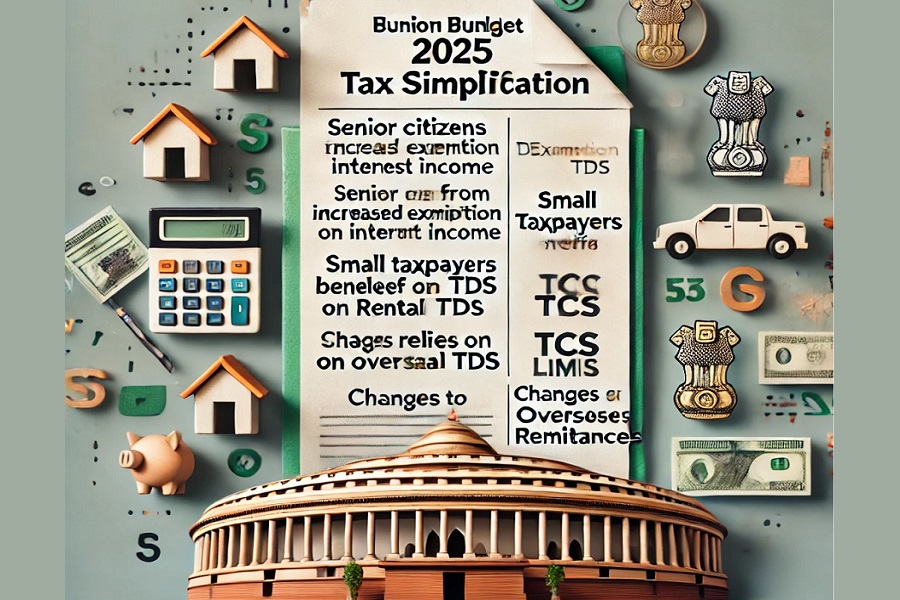Union Budget 2025: Simplifying Tax Compliance with Key TDS Reforms for Senior Citizens, Small Taxpayers, and Remittances

Union Budget 2025 speech, Finance Minister Nirmala Sitharaman introduced several significant reforms aimed at simplifying Tax Deduction at Source (TDS) compliance and offering relief to various taxpayer groups. The reforms focus on reducing the compliance burden, enhancing clarity, and creating a more equitable tax system. Below are the major TDS announcements expected to have a substantial impact:
1. Rationalizing TDS Rates and Thresholds:
One of the most notable steps in the Budget 2025 is the rationalization of TDS rates and thresholds. The government has made efforts to reduce the number of TDS rates and simplify the thresholds at which TDS is deducted. This initiative is designed to streamline the tax process, making it easier for taxpayers to understand and comply, while reducing administrative burdens on both taxpayers and tax authorities.
By cutting down the number of TDS rates and providing clearer thresholds, the government aims to reduce confusion around tax calculations and ensure uniform application of tax deductions across sectors. This will also improve transparency in the system, benefiting both taxpayers and tax collectors alike.
2. Doubling the TDS Limit on Interest for Senior Citizens:
In a significant relief for senior citizens, the Budget proposes to double the TDS exemption limit on interest income from Rs 50,000 to Rs 1,00,000. This move is intended to ease the financial burden on senior citizens, especially those dependent on fixed deposits and other interest-bearing investments. With this increased exemption threshold, senior citizens will be able to earn more interest income without having TDS deducted at source.
This change will provide senior citizens with more disposable income, enhancing their financial independence and helping them better manage the rising cost of living.
3. Raising TDS Limit on Rent for Small Taxpayers:
The Budget also proposes to raise the annual limit for TDS on rent from Rs 2.40 lakh to Rs 6 lakh. This change will benefit small taxpayers receiving smaller rental payments, reducing their compliance burden. As rental income is a common source of earnings for many individuals and businesses, this move will allow landlords and property owners receiving smaller rental amounts to avoid the TDS deduction, which has often been cumbersome for small-scale taxpayers.
This change will simplify the tax process for a large number of landlords and help them retain more income, ultimately benefiting the real estate sector by improving cash flow for property owners.
4. Increasing TCS Limit on Remittances under LRS:
Another key announcement concerns the Tax Collected at Source (TCS) on remittances under the RBI’s Liberalised Remittance Scheme (LRS). The Budget proposes to increase the threshold for TCS collection on remittances from Rs 7 lakh to Rs 10 lakh. This move is aimed at reducing the tax burden on individuals making overseas remittances, including those for education and medical expenses, which are major drivers of outward remittances.
By raising the threshold, the government acknowledges the growing need for individuals to transfer funds abroad for personal and business purposes, while ensuring that the tax system does not unnecessarily burden those remitting smaller amounts.
Conclusion:
The TDS reforms introduced in the Union Budget 2025 are set to simplify tax compliance, provide significant relief to senior citizens and small taxpayers, and promote greater transparency in the tax system. With the rationalization of tax rates, increased limits for senior citizens and small taxpayers, and greater flexibility for overseas remittances, Budget 2025 represents a progressive step towards a simplified and equitable tax regime.
These changes will have a significant positive impact on both individuals and businesses, creating a more conducive environment for growth while ensuring that the tax system remains fair and efficient. The easing of TDS compliance will benefit a wide range of taxpayers, from senior citizens and small landlords to those involved in international financial activities.










More News

Union Budget 2025: Middle Class Cheers as No Tax Up to ?12 Lakh Becomes Reality













